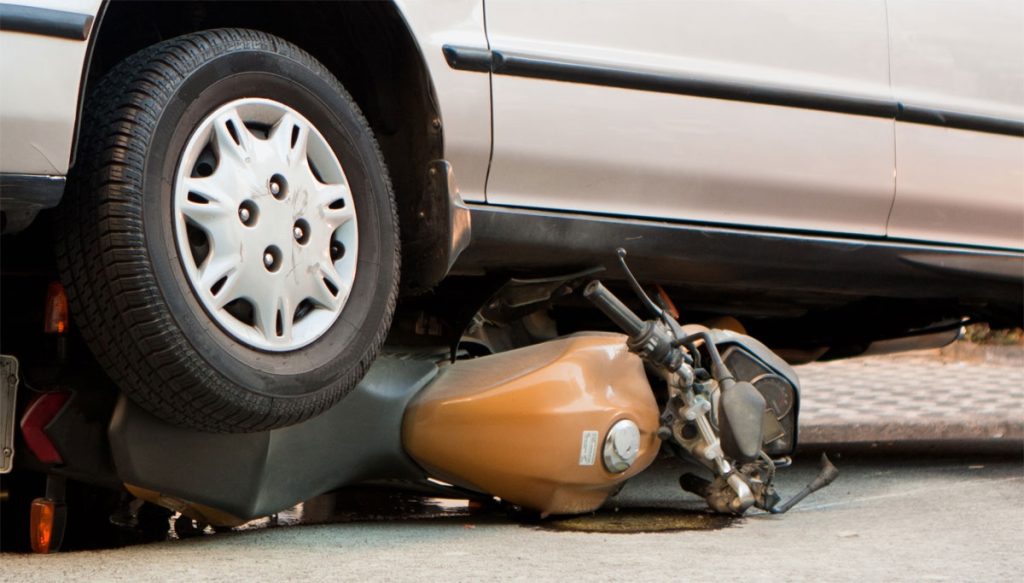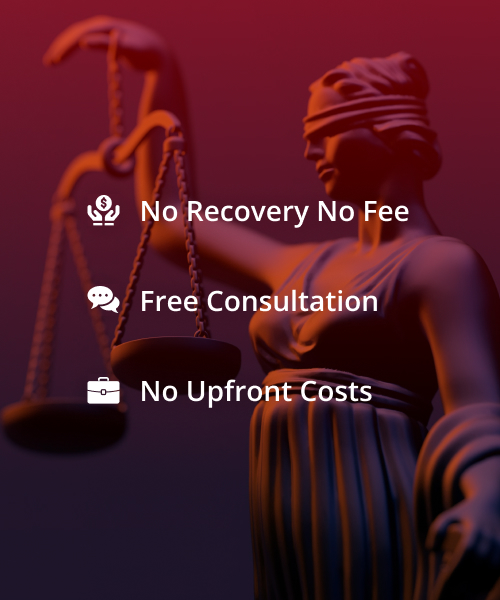Miami Motorcycle Accident Lawyer

Motorcycle accidents in Miami are often caused by negligence. Negligence may be in the form of risk-taking, drivers not paying attention, or other drivers failing to notice a motorcycle due to its smaller size. It is also possible that construction, damaged roads, or other factors play a part. Florida is a very popular destination for motorcyclists due to several motorcycle clubs and rallies. In 2009, there were 8,313 motorcycle accidents, which resulted in injuries to 7,413 people and the deaths of 376 motorcyclists and 26 passengers in Florida. Source: FL Department of Highway Safety and Motor Vehicles. Traffic Crash Statistics Report 2009.
Serious Injuries Occur as a Result of a Motorcycle Accident
Serious injuries are frequent because of greater body exposure. This may be true even in collisions with minor property damage to the motorcycle or moped itself. In minor property damage accidents motorcyclists may still suffer from serious long-term injuries that will have long-term medical expenses and lost wages to match.
Miami Motorcycle Accident Lawyers That Care
The types of personal injuries that may result from motorcycle and moped crashes are extensive. Lower extremity injuries are more common in motorcycle accidents. However, the upper extremity injuries that occur tend to be more severe. A general list of injuries may include, but are not limited to:
- Bone Fractures: Carpal or Metacarpal Fracture, Metatarsal and Tarsal Fractures, Tibula and Fibula, Malleolar Fractures, Patella Fracture, Condylar Femur Fractures, Subtrochanteric & Supracondylar Femur Fractures, Pelvic Fractures, Clavicle Fractures, Scapula Fractures, Humerus Fracture, Radius Fracture, Ulna Fracture
- Crush Injury & Amputations
- Cuts & Puncture Wounds
- Dislocations: Elbow Dislocation into Radial Head, Intercarpal Dislocation, Radiocarpal Dislocation, Pericarpal Dislocation, Dislocation of Glenohumeral/Sternoclavicular/Acromioclavicular Joints, Hip Dislocation involving Articular Cartilage, Carpal-Metacarpal or Metacarpal-Phalangeal Dislocation
- Ligament, Muscle, and Tendon Injuries: Ligamentous Tears: Meniscus Tears; Ruptures/Lacerations: Achilles Tendon Rupture/Laceration, Collateral or Cruciate Ligament Tear, Patellar Tendon Laceration; Muscle Sprains
- Nerve Damage: Radial Nerve Transection, Ulnar Nerve Neuroma, Medial Nerve Injury, Sciatic Nerve Injury, Peripheral Neuropathy
- Neck & Back Injuries: Neck (Burst Fractures, Cervical Hyperextension/Hyperflexion Injuries, Longitudinal Ligament Injuries, Vertebral Fractures, Sprains/Strains); Back (Lumbar Vertebral Fractures, Compression Fractures, Spinous Process Fractures, Spondylolisthesis, Spondylosis)
- Spinal Injuries: Contusion, Central Cord Syndrome, Compression of Spinal Cord, Lumbar Spinal Strains, Spinal Stenosis (narrowing of the lumbar or cervical spinal canal)
- Disc Injury: Disc Herniations (often, these are described in lay terms as a “slipped disc” or a “ruptured disc”), Anular Tears, Disc Bulging, Extruded Nucleus Pulposus in the Cervical, Thoracic or Lumbar Sacral Areas.
- Head & Traumatic Brain Injuries: Concussion, Contusion, Basilar Skull Fracture, Linear Skull Fracture, Acute or Chronic Subdural Hematoma, Brain Herniation from Intracranial Pressure, Subarachnoid Hemorrhage, Intracerebral Hemorrhage, Skull/Parietal Bone Fracture (open head injury), Tinnitus Diplopia, Anosmia, Diffuse Axonal Injury
- Paralysis: Paraplegia, Quadriplegia
- Skin/Tissue Injuries: Road Rash, Degloving Injuries
- Death
In cases involving such injuries our law firm has consulted with medical practitioners, accident reconstructionists and biomechanical experts to collect evidence to illustrate the mechanics of an accident and the resulting injuries. We are always prepared to pursue maximum compensation for your injuries.
Under Florida law, motorcycles and mopeds are not required to carry personal injury benefits insurance like automobiles are. The Florida Motor Vehicle No-Fault Law only applies to motor vehicles, which is defined as a self-propelled vehicle with 4 or more wheels. So, the no-fault PIP benefits up to $10,000 are unavailable for a motorcycle or moped accident victim. FLA. STAT. § 627.732(3).
Contact a Motorcycle Accident Lawyer in Miami, FL
If you have been injured in a motorcycle accident contact Jeffrey R. Davis P.A. for a free case review or call (305) 577-3777 to learn about your legal rights and how to receive compensation for your motorcycle accident injuries. Compensation may include monetary damages to cover expenses for your medical care, rehabilitative therapy, lost wages, pain and suffering. Submit your free case review. Our attorneys will speak with you in English or Spanish/Se Habla Español.
Important Information for Potential Clients Who Have Been in a Motorcycle Accident
What Should You Do Immediately at the Accident Scene?
- Seek medical treatment if injured (*Please do not delay urgent medical attention to gather evidence*.).
- Take pictures of the accident scene and damage.
- Get witnesses’ names and numbers.
- Do not sign any forms until you have consulted with an experienced accident attorney.
Florida Moped Regulations
Some relevant moped laws are below. For a complete list of Florida laws on operating moped or motorcycles see FLA. STAT. §§ 316.208, 316.2085, 316.209, 316.2095, 316.211, or chapter 316 in general.
- In 2-way traffic: Mopeds traveling at the speed limit can drive in the lanes with traffic. However, a moped traveling below the speed limit should be driven as close as possible to the right-hand curb/edge. The only exceptions are (1) to pass another vehicle moving in the same direction, (2) to make a left turn at an intersection or a private driveway, and (3) when moving is reasonably necessary to avoid an object blocking the curve/roadside or the curb becomes too narrow.
- In 1-way traffic with 2 or more lanes: Bicycles should be driven as close as possible to the left-hand curb or edge of such roadway.
- Driving on sidewalks and crosswalks: No person shall propel a moped upon and along a sidewalk while the motor is operating. A person propelling a moped solely by human power on a sidewalk, or across a roadway upon and along a crosswalk, has all the duties and rights of a pedestrian, but must yield the right-of-way to any pedestrian and shall give an audible signal before overtaking and passing such pedestrian.
- Must drive with both hands: No person shall operate a motorcycle or moped while carrying any package, bundle, or other article which prevents the person from keeping both hands on the handlebars.









